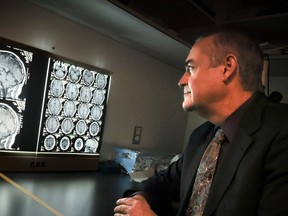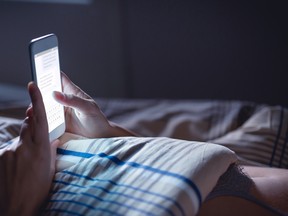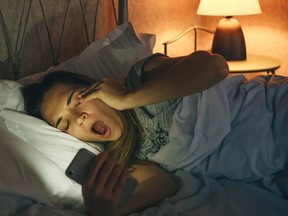‘Exposure to brighter nights and darker days can disrupt our circadian rhythms’
Article content
People who are exposed to high levels of light at night have an increased risk of death compared to those who get high levels of light during the day, according to a new Australian study.
The study, published in the Proceedings of the National Academy of Sciences, analyzed more than 13 million hours of data collected from almost 90,000 participants aged 40 and older.
Advertisement 2
Article content
Participants of the study were monitored through wrist sensors over an eight-year period.
Those exposed to more light at night had between a 21 per cent and 34 per cent increased risk of death. Those exposed to more daylight had a 17-per-cent to 34-per-cent decrease in their risk.
Recommended from Editorial
Sean Cain, a sleep expert from Flinders University in Australia, was a senior author in the research and said that there are a number of health risks from brighter nights and darker days.
“Exposure to brighter nights and darker days can disrupt our circadian rhythms,” Cain said.
Circadian rhythms are the physical, mental and behavioural changes we experience throughout a day, which are linked to the path of the sun.
Dr. Daniel Windred, the lead author in the study and a researcher at Monash University, said the findings emphasize the need for people to limit exposure to light during the time around sleep, especially during late night and early morning.
Article content
Advertisement 3
Article content
“Protection of lighting environments may be especially important in those at risk for circadian disruption,” Windred said.
Diabetes, obesity, cardiovascular disease and mental health issues were among the other possible health concerns people with high night-light exposure may experience.
Michael Antle, a professor at the University of Calgary, who was not involved in the research, said people who live in areas with later sunset times were more prone to health issues, such as obesity and cancer.
“Everything has to happen at the right time in the right sequence, and that timing is controlled by our circadian clock,” said Antle. “(A later sunset time) correlates with them getting 18 or 19 minutes less sleep every night.”

He said Daylight Savings Time (DST) can be a hard time to get healthy sleep, because the sun stays out longer, preventing the body from getting tired.
“(DST) delays dawn, delays dusk, and that means that we’re having light at a time in the evening when our bodies should actually be seeing dark,” said Antle.
Rebecca Robillard, an associate professor of psychology at the University of Ottawa and Co-Chair of the Canadian Sleep Research Consortium told National Post in an email that people ought to limit light on the blue-green spectrum at night. That’s light that comes from the sun, fluorescent bulbs and electronics such as laptops and cellphones.
Advertisement 4
Article content
“Bright light in the evening suppresses our sleep hormones and activates our brain, which makes it harder to fall asleep and stay asleep,” Robillard wrote.
She said sleep disruptions can “increase heart rate and blood pressure, alter insulin regulation, and weaken the immune system.”
Sleep gives time for the body and brain to clear damaging toxins, including, Robillard said, the ones that can cause Alzheimer’s disease. Disrupting sleep prevents the body from being able to do so.
In addition to reducing exposure to night light, the study found benefits to daylight exposure.

Getting natural sunlight can produce serotonin in the body. Serotonin is a precursor to melatonin, a hormone that plays a role in sleep.
Antle said melatonin can also act as an antioxidant and suppress tumour growth. He said studies from the U.S. on nurses who work night shifts showed they had higher rates of cancer compared to those working day shifts.
“The big difference in the blood was the fact that they had no melatonin if they were on the night shift,” Antle said.
Getting outside during the day and avoiding lights at night are easy ways for people to reduce their risk of these health concerns.
“Our findings clearly show that avoiding night light and seeking daylight may promote optimal health and longevity,” Phillips said.
Our website is the place for the latest breaking news, exclusive scoops, longreads and provocative commentary. Please bookmark nationalpost.com and sign up for our daily newsletter, Posted, here.
Article content









